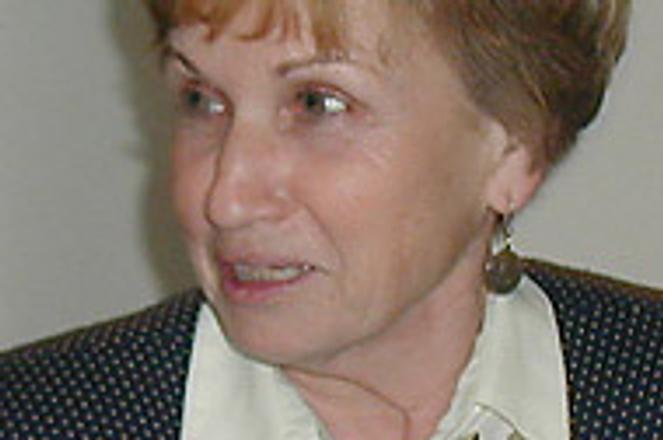Maria Jakabováphoto: Courtesy Nové Slovo
BUDAPEST - As the only ethnic Slovak member of the Hungarian parliament, Maria Jakabová is often asked to greet Slovaks on official visits to Budapest. Sometimes it irks her. "Either I'm valuable or I'm not valuable," she says. "It shouldn't be because I am Slovak."
Born in 1936 to a "peasant family" in a small Slovak village in Hungary, Jakabová began her career teaching Slovak in Budapest. From 1983 to 1992 she was director of the Democratic Federation of Slovaks, and has been a member of parliament for the Hungarian Socialist Party since 1985.
Jakabová supported radical legislation that established 'self-governments' for Hungary's 13 minorities in 1993. As a crusader for minority rights, she is as candid about the problems of Slovakia's Hungarian minority as she is about those of Hungary's Slovak minority. She insists that the Slovak image of the persecuted Slovak minority in Hungary is nonsense, but admits that speaking Slovak in the Hungarian parliament still sometimes draws a disapproving stare.
The Slovak Spectator (TSS): How closely do you follow Slovak politics?
Maria Jakabová (MJ): Everyday.
TSS: What role does the Hungarian government play in disputes involving Slovakia and Slovakia's Hungarian minority?
MJ: The Hungarian government does not want conflict. They have close contact with Slovakia's Hungarian minority, as they do with all five million Hungarians living outside Hungary, so that they don't lose their ties to Hungary. They advise and help - something the Slovak government doesn't do with Hungary's Slovak minority.
TSS: Does the Hungarian government exert control over Hungarian politicians in Slovakia?
MJ: I don't believe that Budapest controls anyone in Slovakia. Hungarian politicians in Slovakia have plenty to worry about with their own voters.
TSS: Does the Hungarian government provoke unrest among Slovakia's Hungarian minority?
MJ: They don't have to. Slovakia's Hungarian minority in southern Slovakia lives in a politically-charged situation created by history. They went to bed in one country one day in 1919, and woke up in another country [when the first Czechoslovak state was carved out of the former Austro-Hungarian empire after World War I - ed. note].
Slovaks who settled in Hungary are a completely different case. They migrated within the same country [Slovaks migrated to Hungary in the 17th and 18th centuries when present-day Slovakia was part of the Austro-Hungarian empire - ed. note] lived with many peoples, and learned to coexist with them. We have never felt anti-Hungarian.
TSS: Is the Slovak-Hungarian border an open question for Hungarians?
MJ: Nobody ever says the borders should be changed, not officially, not among ordinary people. There's one party that says the "tragic action" must be addressed, but they have only 5% in parliament. There are no border questions in central Europe outside the Balkans.
TSS: Some claim that granting the demands of Slovakia's Hungarian minority - whether for more control in local government or a more independent educational system - is the first step to autonomy and ultimately secession.
MJ: That's silly. There are international conventions deciding the borders.
If any minority, be it the Welsh or the Catalans, asks for something - anything - and are prepared to fulfil the task, why not give it to them? If Slovakia's Hungarian minority wants autonomy and can handle the responsibility, why should they be obstructed? Autonomy is a good thing, because people who live closest to problems know best how to solve them. The central government is not the wisest.
Hungarians and Slovaks in southern Slovakia, like Slovaks and Hungarians in Hungary, live together without problems. Politicians make problems. Parties in Slovakia are preparing for elections and playing the Hungarian card.
TSS: Does Slovakia's Hungarian minority have it better than Hungary's Slovak minority?
MJ: In terms of the minorities here and there...you can't compare. The question is, does Hungary's Slovak minority want something? Have they got it? Does Slovakia's Hungarian minority want something? Have they got it?
If you talk to the leaders of Hungary's Slovak minority, we aren't complaining. If you talk to [Hungarian leaders in Slovakia] Csáky or Bugár, they always tell you something their community needs but isn't getting.
TSS: How bad was forced Hungarian assimilation for Hungary's Slovak minority?
MJ: It was strong between the wars. Mass had to be in Hungarian, there were no Slovak schools and no Slovak press.
TSS: Did Slovaks in Hungary already know how to speak Hungarian?
MJ: Yes. Some not well, but the educated spoke perfectly. I didn't speak Hungarian until I went to school at age six [1942]. When I spoke Slovak, I had to stand in the corner. It was the first and only time I faced discrimination.
TSS: A member of the Slovak minority in Hungary said that because his accent resembled that of Slovakia's Hungarian minority, he had been mistaken for a member of that minority during a trip in Slovakia, and had been told to go back to Hungary. Has anything like this ever happened to you?
MJ: Slovak governments have made a big mistake in not making the fact that Slovaks live in Hungary part of Slovak curriculum.
Sometimes when I meet Slovaks, they make guesses such as "You married a Hungarian", or "Your mother was from Slovakia." I reply: "I've been in Hungary since 1721 [when Jakabova's ancestors settled in Hungary]."


